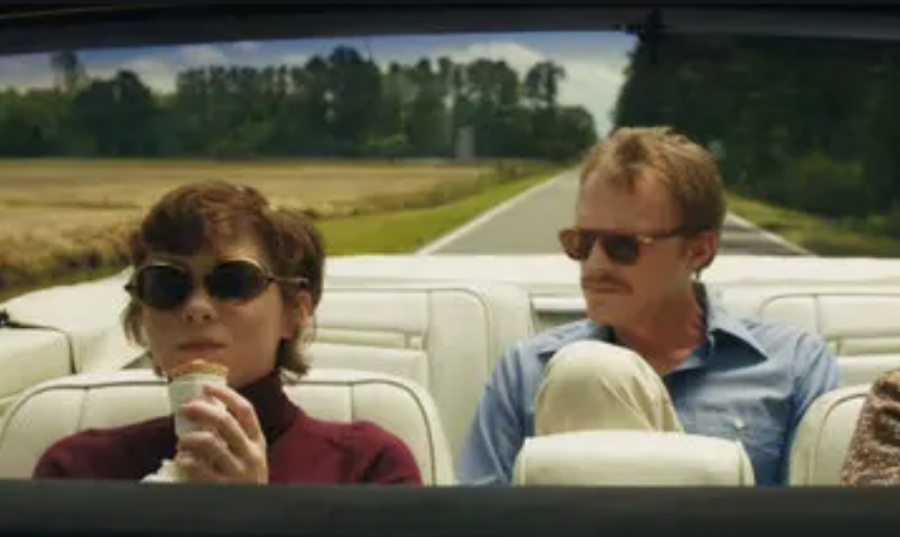“Uncle Frank” portrays a frank and emotional tale
December 12, 2020
As Amazon released yet another old, revamped film on its platform for Thanksgiving weekend, I was expecting “Uncle Frank” to be as boring as any other basic road trip movie. Two laughing fits and one ugly-cry later, I ended up finishing the movie with a strange sense of euphoria.
Originally released in January 2020, director and screenwriter Alan Ball crafts a riveting tale detailing a road trip that Beth Bledsoe (Sophia Lillis) and her uncle Frank Bledsoe (Paul Bettany) take to attend a family funeral. For anyone looking for a rich, suspenseful, yet heartwarming film to watch this holiday season, I highly recommend this unique tale.
Ball’s film, although not an autobiography, is heavily based on his experiences coming out to his mother. Set in the 1970’s, Frank, who is gay, is forced to confront memories he has bottled-up after staying reclusive from his family. As Beth, Frank, and an unexpected guest drive from NYC to North Carolina for the funeral, Frank is forced to disclose some vulnerable details about himself.
The artful casting of the film, especially with Sophia Lillis, played a key role in the immersive nature of the film. Known for her work in horror films, Lillis beautifully portrayed an emotional, confused college student who finds it difficult to navigate her familial life. The actor who played Frank’s lover Wally, Peter Macdissi, not only gave the film some comic relief, but he also made me emotional whenever he offered earnest support to Frank in his lowest times.
Even though the plot is heavily focused on Frank, the supporting characters give viewers some much needed distraction from the rather heavy plotline of Frank every so often. Frank’s family is shown prattling and joking with one another organically, and overall, their family dynamic is both comedic and heartfelt.
While numerous components of the film are standouts, the intricate plot is by far the most gripping element of the film. From paying a visit to the site of an almost-murder to confronting ex-lovers, the film is filled with mysteries and miseries, all of which are unfortunately tied to Frank’s gender identity. Arguably the most emotional scene in the film occurs when Frank reads the family patriarch’s will at the funeral, he learns that the only thing his grandfather leaves for Frank is his disgust and humiliation for his sexuality.
“Ultimately, it’s a movie about feeling; it’s a movie about a character with really bad early-life trauma, and also needs to keep his sexuality and true identity is hidden from his family. Over the course of the movie, Frank needs to confront both hit rock bottom before he can start to heal,” director Ball said in an interview about his movie.
However, the film’s exploration of Frank’s path to healing is at times choppy and convoluted. In the beginning, Frank is portrayed as happy and worriless, but suddenly he wells up with regret and pain soon after the road trip starts. His storyline is powerful but clouded with too many side conflicts for readers to keep track of. I found myself having to pause the film occasionally to put together the basic plot on a handful of occasions, detracting from the gripping movie.
Especially because Beth narrates the film on several occasions in the first half, readers primarily view the film from Beth’s limited, somewhat-unreliable point of view. Although the vulnerable nature of knowing her thoughts helps readers empathize with Beth and her storyline, I wish the movie was told more from Frank’s point of view. Since Beth and Frank are very different people, if the film switched narrators periodically, this omniscient perspective would help readers juxtapose the experiences of these two Bledsoes to result in an even more interesting story.
As the movie comes to a close, themes of family and trusting one’s instincts fill movie watchers with positivity. Ball portrays Frank as a character with many flaws, but instead of criticizing him, he shows Frank at his lowest points and reiterates that it’s normal for people to feel guilty. He actively sends a message to younger demographics that it’s okay to fail sometimes and be unsure of one’s self, but being forgiving of your past wrongs and reaching out to others can help. Especially during a pandemic when it can be hard to seek guidance, “Uncle Frank” ushers growth instead of posing as a cautionary tale.
Overall, “Uncle Frank” is the perfect, satisfying film to watch over the holidays, especially if you enjoyed films/movies such as “Into the Wild” and “The Fault in our Stars.” Call it cheesy or heartwarming, it’s definitely worth streaming with the whole family.
9.5/10








